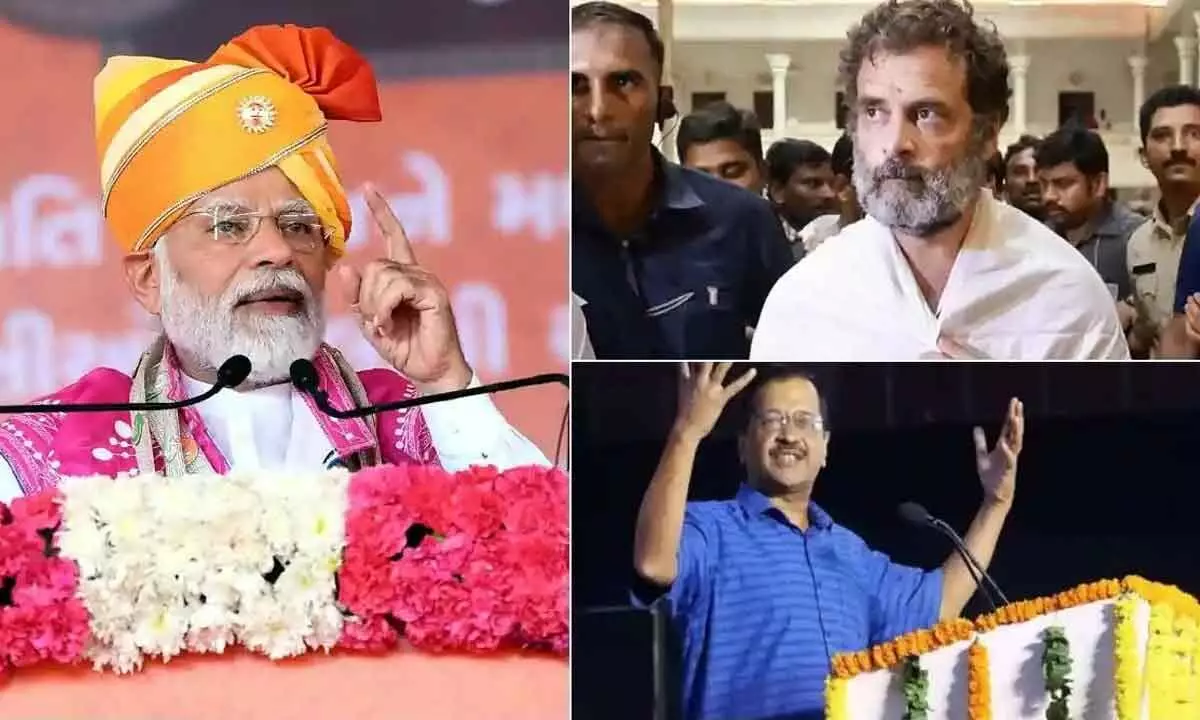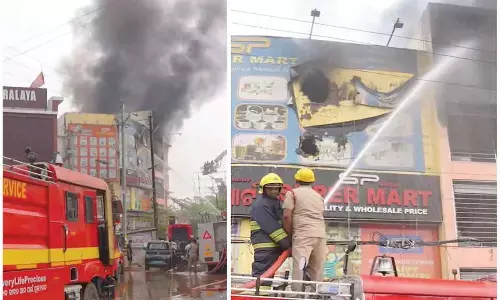What is to be judged in elections?

Assam Chief Minister recently compared Rahul Gandhi with Saddam Hussain. What was he implying? If Rahul is Saddam for him, why cannot Modi be a Hitler to his opponents? There are also more direct moral reasons for concern. To demonise someone goes beyond saying he is mistaken or misguided. It is, as a rule, to denounce his character and to do so in moral terms. The more we get emotional and personal, the more we lose reason and rationality. The result is that democracy suffers a dearth of meaningful social dialogue
Of all animals, man is the most inveterate noise maker. As most of his enjoyments are accompanied by the making of noise, he seems to have undergone a reverse conditioning so that if he is surrounded by noise, he feels as if he is enjoying himself. Such a hypothesis at least helps us in understanding the 'election noise makers' of this country.
There is nothing new to it in fact. These things have been discussed at length by several researchers in 'Issues in Ethics' and similar publications. The barrage of abuse and high decibel campaign have already started for the elections in Gujarat and Himachal Pradesh in the country.
Gujarat obviously makes the most noise because that is where the Modi-Shah duo comes from. For Modi, too much is at stake in Gujarat. If the BJP loses it, it will deliver a body blow to the BJP as never before. That is why the duo takes the elections to heart. It is always seen that when Modi campaigns, the tempers are frayed further and every opponent tries to measure up to him in stature by using abusive language in the belief that it would propel their party's prospects to great heights.
From Maut ka Saudagar to chaiwala to neech jaat...all labels had been given to Modi by the Opposition which forever underestimates Modi's popularity. Such vilification has always helped Modi as the voters think differently in our democracy. This time around, the Congress is sworn to "Modiji ko unka aukat dikhana chahthe hain."
The Congress leaders' penchant for drubbing in the elections is bewildering. It seems they don't like if the going is smooth. They detest trouble-free life and politics. There must be hiccups, otherwise they cannot rest. There is an urge in them to be vituperative beyond the permissible limits so that they embrace the harm's way gleefully.
The Aam Aadmi Party's juvenile barbs are equally harmful. Delhi and Punjab have been different due to peculiar circumstances. Gujarat is different and replacing Modi is certainly not the same as replacing the Congress. Arvind Kejriwal seems to be taking himself seriously. He should not do that. He is a habitual liar and he thinks he can fool voters always just because he has won Delhi and Punjab.
A far more serious approach is required to dislodge the BJP from power and it's no child's play. Continued appeasement of minorities and the calibrated attacks on the symbols of Hinduism and cultural practices are not going to help the Opposition. Kejriwal might not speak on these things but he encourages his leaders to do so and recites Hanuman Chalisa in the end where a controversy erupts.
This is an ancient culture with some 'maryada seemas' and one does not talk about elders in a condescending tone and tenor. The proclivity to demonise the opponents is not right. Modi knows how to turn such attacks into weapons of destruction. This is not new...the attempt to demonize. It has been there since ages. But, we are seeing it more often in every State.
Often, the political slugfest deteriorates into character assassination, smear campaign, and abuse. There are good reasons for concern about this sort of thing. One reason is the adverse effect demonising our opponents has on the kind of public discourse democracy needs to succeed.
Democratic societies require a free exchange of ideas among a populace willing and able to make informed judgments about them. But if we fail to engage in the rational examination of ideas and seek, instead, to work our will through vilification and personal attack, the democratic process is subverted. This diversion only makes our assessment too personal and means that we are not detached in assessing someone's work or prejudiced. Thus, we won't be able to judge the strengths and weaknesses of differing viewpoints.
Because, as Professor Christopher B Kulp of Markkula Centra for Applied Ethics says, we then become less able to see the strengths and genuine weaknesses of alternative viewpoints. When we become less attentive to the far more serious issues or deeper issues, we opt for sensationalism stemming from abusive campaigns. Every political party does it in our country as there is never any informed debate. Even if a discussion is held on our TVs, it will be centred around the abuse and who gains what out of it.
There are several points to ponder in these two States of Gujarat and Himachal Pradesh – unemployment, spiralling prices and inflation, state of small industry – and on whether promises incorporated in previous manifestos are implemented etc. But, none of these occupies centre-stage.
Public discourse has become more focused on someone's acquisition of power as it is preoccupied with sensationalism. It's time we question ourselves: Are we discussing personalities or policies in the elections? Are we discussing religion or the Law when crime and violence is our topic?
What is to be judged in elections by the by? Is it the performance of the governments and their actions? Or is it important for us to deliberate on the characters of people? A leader's calibre or character becomes evident when we look at his contribution to the nation building efforts. Isn't it so? The more we get emotional and personal, the more we lose reason and rationality. The result is that democracy suffers a dearth of meaningful social dialogue.
Vilification is not the only aspect that we should be concerned with. Disparaging remarks also fall in the same category and have the same effect. We first hear such remarks and then follow the meme fest over it. Assam Chief Minister recently compared Rahul Gandhi with Saddam Hussain. What was he implying? If Rahul is Saddam for him, why cannot Modi be a Hitler to his opponents?
There are also more direct moral reasons for concern. To demonise someone goes beyond saying he is mistaken or misguided. It is, as a rule, to denounce his character and to do so in moral terms. The moral status of one's character, however, is closely tied to the moral status of one's intentions. Thus, it is a conceptual confusion to say that a person's character is evil even though his/her intentions are good. Well, we don't even read or study Morals and Ethics as subjects with greater care during childhood and hence, default on those issues.
Lastly, why do we hate questions so much nowadays? Questioning and debating have been inherent to Hindu society for ages. We not only take forward our knowledge but also strengthen our democracy through probing. Why do we prefer to discuss one's intention the moment a question is posed? Is not an intention the most opaque subject? Even if we know what a person's intentions are, is it easier to assess (him or her)?
Let us not reduce our capacity to uphold democratic practices.



